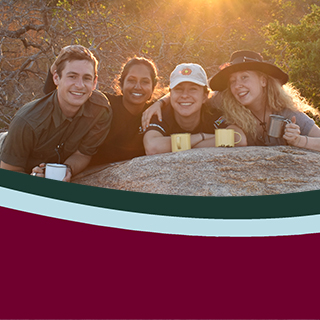Fall 2023 Courses
Art Activism and Protest (in Eastern Europe and the US)
Ona Renner-Fahey- Tuesday and Thursday 2:00-3:20pm
Through the lens of Art Activism and Protest, we can compare and analyze varied and urgent responses to global concerns, such as war, colonialism, racial discrimination, and gender inequality. Content that we will explore will cover a wide range of art forms, styles, and periods—from Marina Abramović’s conceptual art and Ukrainian tattoo art to the music of Bob Dylan and the Black Eyed Peas. The second half of the course will involve engaging in project-based group work, which will take us outside the classroom, meeting with local artists to explore media, design, and the execution of an art activist project.
Can Giving Change the World?: Engaging Social Responsibility through Philanthropy
Greg Larson- Monday, Wednesday, and Friday 11:00-11:50am
This course examines the relationship between the individual and society by addressing the question: How do individuals and organizations address pressing social problems to create meaningful change? Through the lens of philanthropy, this course introduces students to social responsibility and some of the big problems facing society. We will learn about how philanthropists and social entrepreneurs are creatively combating the most pressing social problems, such as poverty, environmental degradation, and disease at local, national and global levels. A large portion of the course focuses on a hands-on grant-making project where the class will explore community needs, solicit grant proposals, visit prospective grant finalists and, ultimately, give away $10,000 in real money to local nonprofits.
Energy Conflict in a Changing Climate
Peter McDonough- Monday, Wednesday, and Friday 10:00-10:50am
Energy Conflict explores the wicked problems of a complex and ubiquitous energy system. Coal towns facing uncertain futures, nuclear power plants exploding, oil pipelines stuck in court, and the growing carbon footprint of the Global South all present logistical and ethical dilemmas. By exploring these conflicts, students will explore ideas of intergenerational justice, energy dependence, cultural trauma, equity, and much more in the context of climate change and globalization. Guiding questions, in-class activities, iterative discussions, and formal debates frame each major issue to paint a picture of informed leadership in situations where there are no “right” answers.
Global change and human disease transmission
Brandon S. Cooper- Tuesday and Thursday 9:30-10:50am
Global change presents unprecedented challenges for the human population, including increased disease burden inside and outside of the tropics. Neglected tropical diseases (NTDs) afflict over one billion of the poorest individuals on the planet, and changing environments are expanding the impacts of NTDs globally. Until recently, many of these diseases have been overlooked by the medical and research communities. This class surveys NTDs and the novel techniques aimed at combating them. Collaborative team and project-based activities, combined with active-learning opportunities and interactions with international researchers and public-health officials, will enhance student understanding of this problem through multidisciplinary instruction.
Migration and Refugees in the Modern World
Gillian Glaes- Tuesday and Thursday 11:00am-12:20pm
Given the current refugee crisis occurring internationally and the over 100 million displaced persons worldwide, this course will examine historical issues related to the contemporary migration crisis that the global community is facing. To provide a comparative historical and global perspective, students will explore the history of refugees and migration through several case studies, ranging from interwar and postwar Europe to Cuba and Sudan. The course encourages students to draw comparisons between different countries and time periods while also providing the opportunity to explore various case studies involving refugees, asylum seekers, and migrants. As Missoula has resettled hundreds of refugees, the course will also provide the opportunity to hear from organizations involved in those efforts, such as the International Rescue Committee and Soft Landing Missoula
Music, Meaning and Manipulation
James Randall- Tuesday and Thursday 12:30-1:50pm
We are inundated with music in our daily life, but few consider how it influences our thoughts and behaviors. In the media, music is used in sophisticated ways to sell us products, political candidates, and belief systems. We are being manipulated. While music may seem like magic, there’s a careful process behind it. This course examines research in the fields of musicology, neuroscience, anthropology, psychology, advertising, and film studies to understand the tricks of the trade. Assignments include short essays, class presentations, and group creative projects. No prior musical experience is required.
Telling True Stories: Global Perspectives of Settler Colonialism
Andi Hoelzel- Monday, Wednesday, and Friday 9:00-9:50am
What is settler colonialism? How can an honest exploration of settler colonialism and its impacts help us to situate our own identities inside complex global issues and attempt to address these issues as well? Neither white supremacy nor settler colonialism can be relegated to the past, instead, they inform present-day cultural, environmental, and political issues in the U.S. and abroad. In this course, students will engage with the multidisciplinary field of Settler Colonial Studies through various mediums. Students will explore theories of settler colonialism, examine current and historical projects of settler colonialism through specific case studies, analyze various aspects of their own identities and how they shape their positionally as well as how they are impacted by settler colonialism, and imagine the possibilities for a more just and equitable future.
